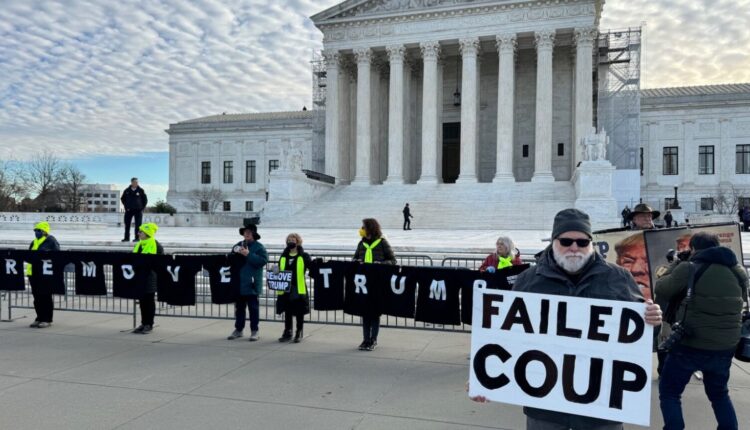U.S. Supreme Court strikes down Colorado 14th Amendment ruling, clearing Trump for ballot
Former President Donald Trump must be placed on Colorado’s 2024 ballot, the U.S. Supreme Court ruled unanimously on Monday, striking down a first-of-its-kind holding by the Colorado Supreme Court that the Republican front-runner is disqualified from office under a Civil War-era insurrection clause.
“Because the Constitution makes Congress, rather than the States, responsible for enforcing Section 3 (of the 14th Amendment) against federal officeholders and candidates, we reverse,” justices wrote in the unsigned, “per curiam” opinion.
The ruling — which comes just one day before Colorado holds its presidential primary election on “Super Tuesday,” March 5 — brings an end to a six-month legal saga that began in Denver District Court and sent shockwaves through American politics during its fast-tracked ascent through the judicial system.
GET THE MORNING HEADLINES DELIVERED TO YOUR INBOX
SUBSCRIBE
Six Republican and unaffiliated Colorado voters, backed by the nonprofit Citizens for Responsibility and Ethics in Washington, filed a lawsuit last September alleging that Trump’s actions in relation to the Jan. 6 attack on the U.S. Capitol disqualify him from office under Section 3. The clause prohibits a person who “engaged in insurrection” after taking an oath to support the Constitution from holding office again.
In a 4-3 majority opinion issued Dec. 19, the Colorado Supreme Court sided with the plaintiffs, ordering Colorado Secretary of State Jena Griswold not to certify Trump’s candidacy for the state’s 2024 Republican presidential primary. The historic ruling, which drew furious condemnations from leading Republicans and even some centrist and liberal commentators, set the stage for similar decisions by Maine’s secretary of state later in December and an Illinois judge last week.
Though all nine U.S. Supreme Court justices agreed on the outcome of the case, the opinions released Monday show a divide over how far the court should have gone to settle key issues relating to the enforcement of Section 3.
In his appeal to the U.S. Supreme Court, Trump’s attorneys challenged the Colorado ruling on a variety of grounds. In addition to arguing that enforcement of Section 3 required an act of Congress, Trump’s team put forward a theory that Section 3’s reference to “officer(s) of the United States” did not include the presidency, and disputed claims that the Jan. 6 attack was an “insurrection” and Trump “engaged” in it.
Monday’s ruling is silent on the latter two questions. But five Republican-appointed justices — Chief Justice John Roberts and Justices Clarence Thomas, Samuel Alito, Neil Gorsuch and Brett Kavanaugh — appear to back strict limitations on how the insurrection clause can be enforced. Citing a precedent known as Griffin’s case, an 1869 circuit court opinion authored by Chief Justice Salmon P. Chase, they wrote that it was “necessary” for Congress to enact enforcing legislation pursuant to Section 5 of the 14th Amendment, which states that “Congress shall have power to enforce, by appropriate legislation, the provisions of this article.”
“The Constitution empowers Congress to prescribe how those determinations should be made,” the ruling says, referring to the Enforcement Act of 1870 and Section 2383 of the U.S. Code, a statute prescribing a criminal penalty for “rebellion or insurrection,” as appropriate uses of the Section 5 power.
That interpretation appears to foreclose the possibility that Section 3 could be enforced by federal courts or by Congress through other means, such as by refusing to seat insurrectionist members or declining to certify the election of an insurrectionist president. In a separate opinion, Justice Amy Coney Barrett wrote that she did not join the other conservative justices in deciding that issue. And in a third opinion, the three Democratic-appointed members of the court — Justices Sonia Sotomayor, Elena Kagan and Ketanji Brown Jackson — called the majority’s Section 5 findings “as inadequately supported as they are gratuitous.”
“Today, the majority goes beyond the necessities of this case to limit how Section 3 can bar an oathbreaking insurrectionist from becoming President,” the liberal justices wrote. “Although we agree that Colorado cannot enforce Section 3, we protest the majority’s effort to use this case to define the limits of federal enforcement of that provision.”
The Colorado ruling never took effect, because the justices stayed their order pending U.S. Supreme Court review, and Trump still appeared on GOP primary ballots, which were mailed to Colorado voters beginning Feb. 12. Monday’s U.S. Supreme Court ruling ensures that all votes cast by Colorado primary voters for Trump — the overwhelming favorite for his party’s nomination following the withdrawal of nearly all of his major rivals from the race — will be counted.
“I am disappointed in the U.S. Supreme Court’s decision stripping states of the authority to enforce Section 3 of the 14th Amendment for federal candidates,” Griswold wrote on X following the ruling. “Colorado should be able to bar oath-breaking insurrections from our ballot.”
“In accordance with this decision, Donald Trump is an eligible candidate on Colorado’s 2024 Presidential Primary,” Griswold said.
This story was originally published by Colorado Newsline, a sister publication of Arizona Mirror and a member of the States Newsroom network of local newsrooms.



Comments are closed.